If you’re starting out as a translator or hoping to enter the language industry, you might be wondering about how to get translator certification. How important is getting certified as a translator? What’s the best way to go about it? Read on because we’ve got the lowdown on translator certification for you!
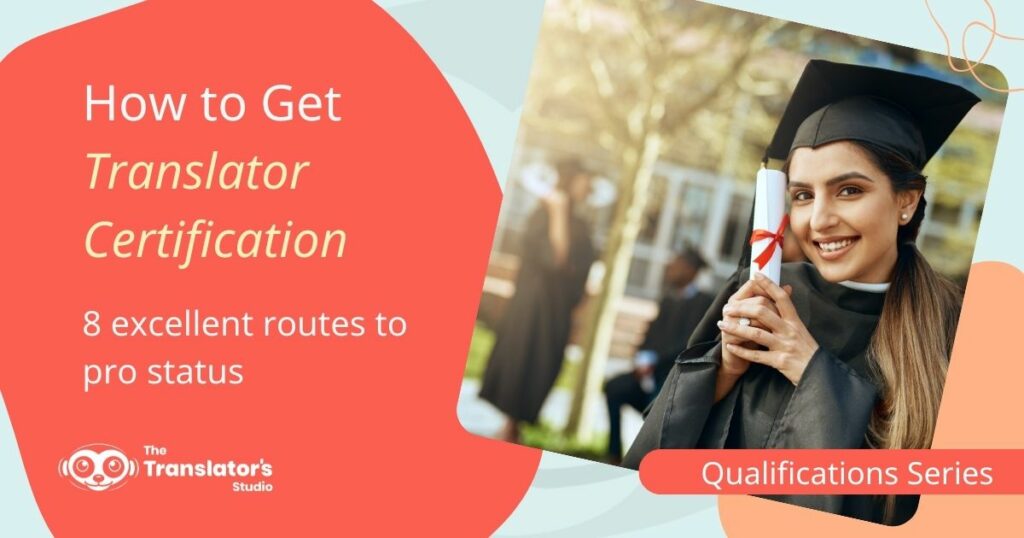
What qualification do I need to be a translator?
There isn’t a single qualification that all translators have. In fact, translation isn’t a regulated profession. So, anyone can set up as a translator without any type of translation qualification. This means you can offer translation services without having to pass any translation certification exams or tests, regardless of your language combination.
Unsure whether you're ready for the CertTrans, ATA exam or DipTrans?
Do our free translation level test and find out.
Available for Spanish- and French-to-English translators.
But before you go running off to update your translator’s LinkedIn profile and start applying for work, it’s important to remember that clients probably won’t offer you any work unless you have translator training and a translation qualification.
Translation techniques don’t just come naturally and a professional translator needs more than simple language skills. You have to develop professional writing skills in your target language and understand all the components that come together to create a quality translation.
If you want to be a serious language professional, learning how to translate and getting certified as a translator is fundamental.
Which are the best translation qualifications to get?
The best qualifications to get if you want to be a translator are the CIOL Diploma in Translation (DipTrans) an MA in Translation Studies. These are both official post-graduate translation qualifications that are well-respected in the translation industry.
- Become a confident professional translator
- Learn fast with our extremely detailed feedback
- Prepare for the CertTrans exam
- Get your translation certificate
What’s the difference between having translator certification and being a certified translator?
Translator certification refers to both official translation qualifications and to unofficial certificates in translation.
Official translation qualifications include the CIOL CertTrans, the CIOL DipTrans and degrees in translation awarded by universities. These qualifications are regulated by the government or by the university.
Unofficial certificates in translation are awarded by course providers like us and some translation associations, such as the ATA and the ITI. These certificates are subject to internal controls within the organisation but aren’t regulated by the government or a university.
A certified translator could mean the translator has one of the qualifications or certificates mentioned above. But the term certified translator is also used to mean a sworn translator. This is a translator who is officially recognised by the government as being qualified to sign off on the accuracy of translations for use in court and in other official procedures.
The way to become a sworn translator varies depending on the country. More on this below.
- Become a more successful translator
- Learn fast with extremely detailed feedback
- Prepare to pass the CIOL DipTrans exam
- Get your advanced translation certificate
How to become a qualified translator
Becoming a qualified translator is no longer optional if you want to work as a translator. A translation qualification shows that you’ve learned the professional process involved in producing an accurate and idiomatic translation (drafting, checking, editing and proofreading). This post explains the different options available to linguists who want to become certified translators by obtaining a translation qualification.
1. CIOL Level 6 CertTrans exam (Certificate in Translation)
The officially regulated CertTrans certificate in translation (level 6, undergraduate level translator certification) is awarded by the Chartered Institute of Linguists (CIOL). The qualification is obtained through a professional exam.
You can sit the CertTrans in different language combinations (follow above link for full info). It’s a good qualification if you’re just starting out in the translation industry. Being able to get online translation certification this way is a plus.
Pros of the CertTrans
- The only government-regulated certificate in translation awarded by a translator’s association.
- Faster and cheaper to get than a degree in translation.
- You can sit the exam online.
- No qualifications are required to sign up.
- Three sittings a year means you don’t have to wait long to sign up.
- If you pass, you can apply for full membership of the CIOL.
Cons of the CertTrans
- The CertTrans is a starting point. You’ll need to keep on refining your translation and writing skills and further qualify to consolidate yourself as a translator and get higher-paying translation work.
- New in November 2022, the high pass rate of around 80% is leading some to question the value of the qualification.
- Paper-based resources only, no Internet allowed in the exam.
Recommendations: prepare cheaply for the CertTrans with our CertTrans Examination Trove for all language combinations. Prepare properly and put yourself on the road to professional translation with our Translation Conversion Course. Alternatively, do a one-off practice test and get our extremely detailed feedback
What we think: the CertTrans has worked out for our students as a way to get a translation qualification on their CV. Some have reported that they’ve got translation work as a result of combining the CertTrans with our Translation Conversion Course. Most look at it as a stepping stone on the road towards getting the DipTrans. In any case, we think this is the best early-career translation qualification to help you get started in the translation industry.
Further reading: “What’s the difference between the CertTrans and DipTrans”.
All you need to understand how to pass the CIOL CertTrans exam.
- Self-study
- All language combinations
2. CIOL level 7 DipTrans exam (Diploma in Translation)
Once you know how to translate at a professional level and have completed a DipTrans preparation course, you can sit the officially regulated DipTrans postgraduate diploma in translation awarded by the CIOL. This translator certification is also obtained through an exam. With this qualification, you can sign off on a certified translation.
Pros of the DipTrans
- The DipTrans is the gold-standard translation qualification. It impresses potential clients.
- Faster and cheaper to get than a university degree.
- You can sit the certification exams online.
- No qualifications are required to sign up.
Cons of the DipTrans
- This challenging exam has a high fail rate so you have to be prepared for that possibility.
- Exam preparation is a must. We have you covered with our DipTrans preparation course.
- Paper-based resources only, no Internet allowed in the exam.
- You have a maximum of three years to pass all papers and get the full qualification.
Recommendations: consult us before you sign up for the exam to see if your profile makes signing up advisable. Definitely do our DipTrans preparation course. Ideally, do both our Conversion Course (pre-DipTrans course) and our Advanced Translation Course (DipTrans preparatory course).
What we think: if your goal is to be a working professional translator then the DipTrans is the best translation qualification to get.
Further reading: “A Perplexed Translator’s Guide to the MA in Translation Studies and DipTrans“; “DipTrans: the Real Costs and Returns“.
|
|
- Become a confident professional translator
- Learn fast with our extremely detailed feedback
- Prepare to pass the CertTrans exam
- Get your translation certificate
- Network in our private Facebook group
- Become a more successful translator
- Learn fast with our extremely detailed feedback
- Prepare to pass the CIOL DipTrans exam
- Get your advanced translation certificate
- Network in our private Facebook group
3. BA in Translation or MA in translation
This type of translator certification is either an undergraduate degree in translation or an MA in translation awarded by a university. You can get the certification online or by doing an in-person degree.
In English-speaking countries, translators taking the academic route tend to get a degree in foreign languages and then do an MA in translation studies. In countries like Spain, the norm for translators is to have done a degree in translation and interpretation to become a certified translator.
Don’t confuse a university master’s degree with the “masters” awarded by non-university centres in countries like Spain and France. They don’t have the same value because they aren’t officially regulated by a university or the government.
Pros of a degree in translation
- Comprehensive learning curriculum covers all aspects of translation.
- The most prestigious type of qualification.
- The MA in translation studies is useful if you want to be a freelance translator working for international institutions.
Cons of a degree in translation
- High cost.
- High time commitment.
- Tough entry requirements to ensure language proficiency.
- Lack of specialisation in fields other than translation and languages, such as technical translation and legal translation.
What we think: getting an MA in translation is a good idea if you have the time and cash to invest and if you’re interested in studying both the theory and practice of translation. It’s extremely useful if you want to go into project management in the language services industry. See examples of translation-related vacancies on Jooble.
Given the importance of specialisation and diversification when it comes to securing ongoing freelance work, we prefer combining the DipTrans with a degree in something else if the goal is to become a freelance translator.
Further reading: “Is It Worth It for You To Do an MA in Translation Studies?” and “Translation Degree, MA in Translation Studies or DipTrans?”
4. Governmental translation certification (sworn translation)
In some countries, professional translators wishing to work in official capacities can register with the government as sworn translators. The process for doing this and the qualifications required will depend on your country of residence. Official translation and interpreting exams may be involved to check your translation skills.
In countries like Spain, you can register as a sworn translator on completing translation degrees from certain universities. Only registered translators are allowed offer traducciones juradas (sworn translations i.e. certified translation services for use in official procedures) in Spain.
Conversely, countries like the UK don’t have sworn translators. In the UK and USA, for instance, translators with official qualifications like the DipTrans or an MA in translation studies can normally sign off on translations for official use. It’s helpful if you’re a member of a translators’ association as well (in the UK, the CIOL or ITI; in the USA, the American Translators Association, known as the ATA).
Pros of being a sworn translator (government-approved translator)
- Status impresses clients and can lead to higher volumes of work.
- Opens doors to certified translation work that only official translators are allowed to do.
- Good rates.
Cons of being a sworn translator (government-approved translator)
- It can be laborious process to obtain the status.
- Training, qualifications and/or association accreditation will be essential.
- You may have to sit official certified translator exams, which can be hard to pass.
- You may be required to certify translations written in a target language that isn’t your native language. This can be difficult and stressful as it’s impossible to be certain of the quality.
What we think: lots of certified translators do very well financially out of being able to sign off on translations for official use. That said, some translators think certified translation work is repetitive and boring.
Further information: Gwenydd Jones and Catharine Cellier-Smart discuss how to become a certified translator in France in this YouTube interview.
5. Entry exams to be an official translator or interpreter for the EU, UN and other large institutions
Not exactly translator certification, but large institutions like the EU and UN require their in-house translators to pass competitive exams to work for them. This would strengthen any translator’s CV.
Work for institutions of this type is also available to qualified freelance translators who join tenders with language service providers and translation agencies. To be able to join these tenders, you normally need to have a translation degree or the DipTrans.
Pros of competing to work for international institutions
- Gain entry to secure, well-paid jobs.
- Prestige.
- Long-term career prospects.
- Internal training opportunities.
Cons of competing to work for international institutions
- You’ll probably need a relevant graduate or postgraduate language, translation and/or interpreting qualification to be able to sit the entry exams.
- Two source languages are normally required.
- You may have to relocate.
What we think: consider applying to work as a translator for an international institution if you want to commit to a career with them, would prefer to work in-house and are happy to relocate if necessary.
6. Certification exams offered by translators’ associations
Some translators’ associations offer their own certification exams. These include the ATA certification exam (USA), the ITI membership exam (UK) and the CTTIC exam (Canada). These translation exams and assessments are set and marked by the associations. You can usually do them online.
It’s inappropriate to compare passing association exams with getting the DipTrans or an MA in Translation Studies. The latter are official translation qualifications that are subject to strict regulations.
Pros of getting a translators’ association certificate
- Well respected, cheaper and easier to get than degrees and postgraduate diplomas.
- Regular exams throughout the year make this a fast route to becoming a certified translator.
- Previous qualifications not typically required.
- Passing the exams normally mean you can apply for membership or improve your membership level.
Cons of getting a translators’ association certificate
- Insufficient alone to be considered a qualified professional translator.
- Training and experience may be needed to pass harder exams like the ATA certification exam.
- You may have to become a member to be allowed to sit the exams.
What we think: being a member of a professional translator association is a very good idea if you want to be a successful translator. Passing these exams without any other training probably won’t be enough to secure well-paid ongoing translation work. However, ATA certification is well respected, particularly in the USA.
Further information: “How to Become an Accredited Translator to Get More Work”. Gwenydd Jones interviews David Stephenson about the ATA translator certification exam on our YouTube channel.
7. Membership of translators’ associations
Translators’ associations offer different levels of membership. The level you can join at will depend on your existing translation qualifications and experience. While this won’t make you a certified translator, it will show potential clients that you take a professional approach to your work.
Pros of being a member of a translators’ association
- A translator accreditation solution for unqualified translators (“junior” member option).
- Use of the logo in your marketing shows clients you’re a serious professional.
- Inclusion in the association search engine to help potential clients find you.
- Membership benefits include free training, free mentoring, networking events and member discounts.
- Member forums are a great way to get help and get to know other professionals.
- Access to professional exams.
Cons of being a member of a translators’ association
- Yearly membership fee can be quite a lot on top of your other business costs.
- Not a translator qualification so unsuitable alone if the goal is to become a certified translator.
What we think: while we appreciate that the cost of joining a translators’ association may be a lot to take on when you’re starting out, the value will outweigh the investment as long as you participate and take advantage of the benefits available to you.
Further information: the Mediterranean Editors and Translators Association (MET) is a low-priced association that offers lots of free training and support. Check out my YouTube interview with MET chair Emma Goldsmith.
8. Certification from independent translator training operators
The Translator’s Studio is an independent course provider that teaches the art of translation. We offer a range of translator training courses and issue our own certificates. To date, we’ve taught the art of translation to more than 200 students and seen excellent results in both the CertTrans and DipTrans exams. Combining our course with these exams is an excellent way to become a certified translator.
Our leading courses, the Professional Translation Conversion Course (pre-DipTrans/CertTrans/ATA exam) and the Advanced Translation Course (DipTrans) will help you understand how to produce a professional translation and pass your translation exam. Our popular Punctuation Pro will enable you to get a certificate to show off your expert punctuation knowledge.
We’re not the only translator training centre, but we’re an excellent place to become a more successful translator under the tuition of top freelance translators and experienced, caring teachers. We’re a particularly good choice if your language combination is Spanish or French to English.
Check out our courses!
Pros of getting a translation certificate from The Translator’s Studio
- Low-cost alternative to university but with university-standard courses and teaching.
- Prepare for the CertTrans, the DipTrans or a translators’ association exam.
- Become part of a strong network of successful freelance translators.
- Get one-to-one mentoring from our teachers who are successful, working freelancers
- We specialise in Spanish and French to English, making us the best choice for those language combinations.
- Extremely detailed feedback, much more than the simple proofread that you’ll get on other translation courses.
Cons of getting a translation certificate from The Translator’s Studio
- While we issue certificates, we can’t issue an official translation qualification that will allow you to sign off on a certified translation.
- Our courses are carefully designed and our teaching is thorough, which means we’re a high-ticket option (and proud of it).
- Our courses are demanding to make sure you learn, so don’t expect training with us to be a breeze.
- In terms of language combination, we only cater for Spanish to English, French to English and English alone.
FAQ on translator certification
Hopefully this article has answered most of your doubts about translator certification. Just to make sure we’ve done a thorough job, here are a few more pointers to help you in your path to become a certified translator.
How long does it take to become a certified translator?
The time you need to get your translator certification depends on your starting point. Assuming your language skills are there (you should have at least a C1 reading level in your second language), you could start by taking our Professional Translation Conversion Course and then sitting the CertTrans exam. By doing this, you can get your initial translation certification within six months.
After that, it would be advisable to continue training on our Advanced Translation Course and refining your skills through professional or volunteer translation (e.g. for TED or Translators without Borders). You could then consider doing higher-level translator certification through the DipTrans exam.
How do I certify myself as a translator?
When you certify yourself as a translator who is sufficiently qualified to sign off on a certified translation, you should include your full name and list your qualifications including your professional memberships.
If you don’t have any translation qualifications or professional memberships, you aren’t sufficiently qualified to provide certified translations.
How do I become a certified translator without a degree?
To become a certified translator without a degree you should pass the CIOL CertTrans and the CIOL DipTrans official translation qualifications.
If you have clients in the USA, you could consider starting with the ATA certification exam and then moving on to the CIOL DipTrans.
Translator Certification Courses from The Translator’s Studio
|
|
- Become a confident professional translator
- Learn fast with our extremely detailed feedback
- Prepare to pass the CertTrans exam
- Get your translation certificate
- Network in our private Facebook group
- Become a more successful translator
- Learn fast with our extremely detailed feedback
- Prepare to pass the CIOL DipTrans exam
- Get your advanced translation certificate
- Network in our private Facebook group

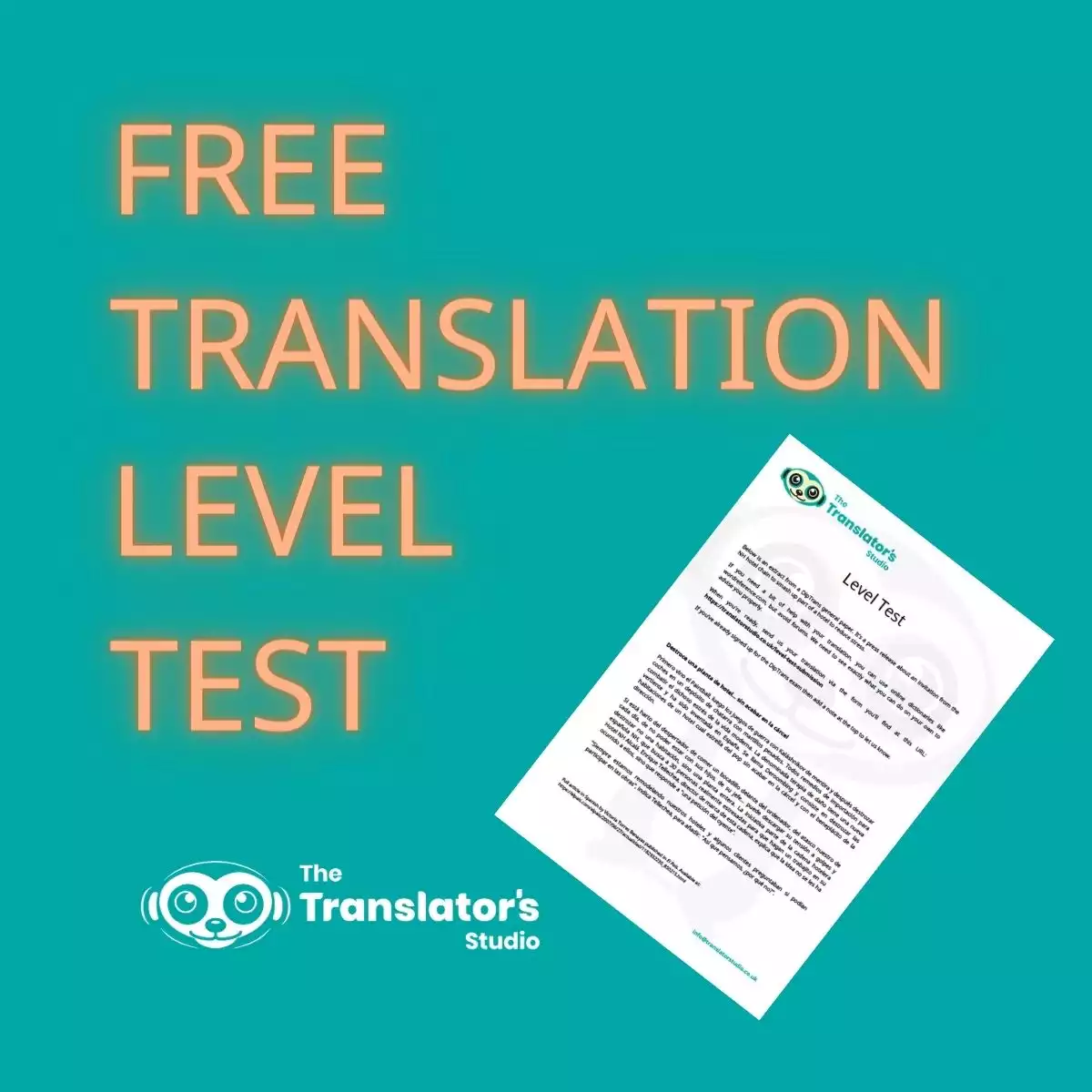
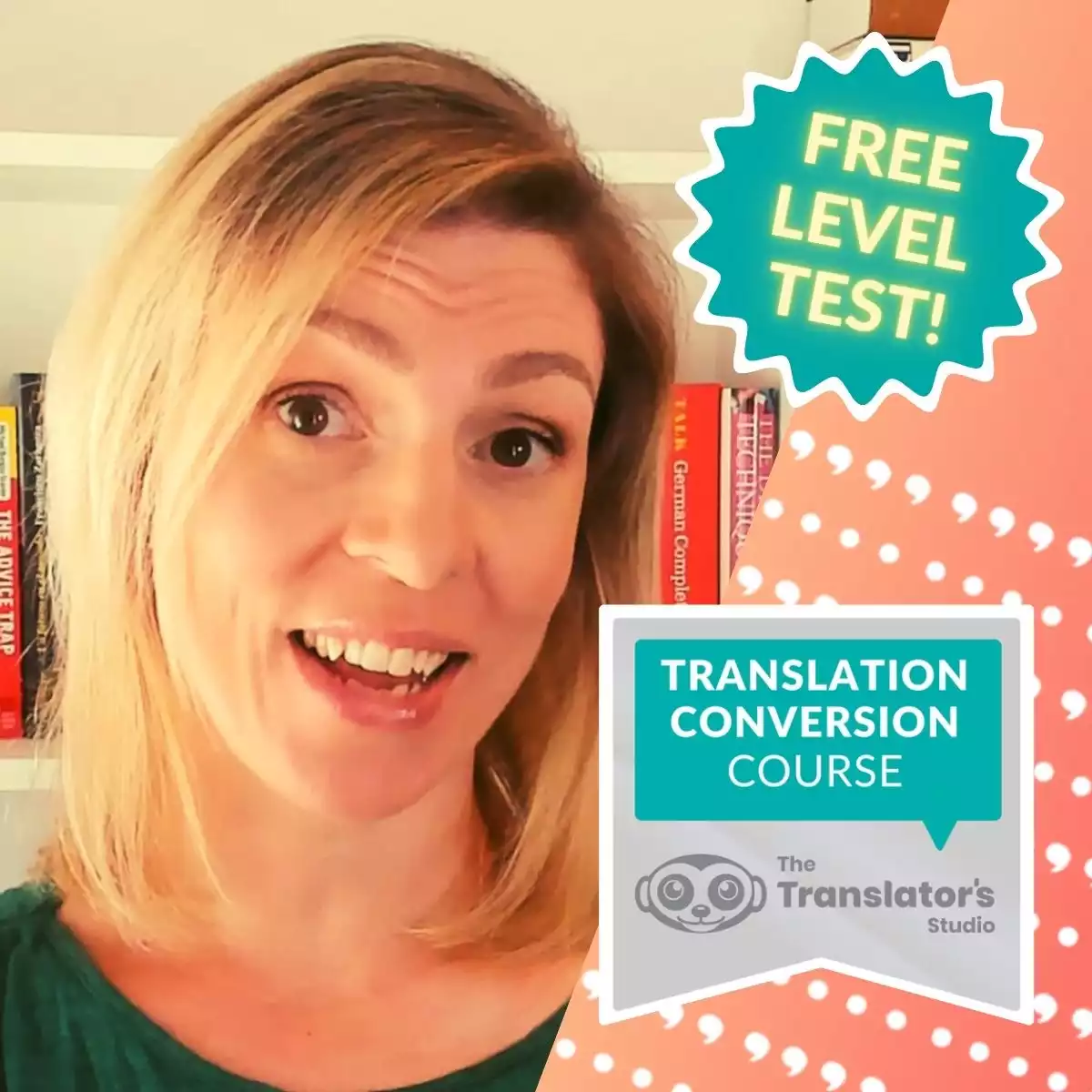
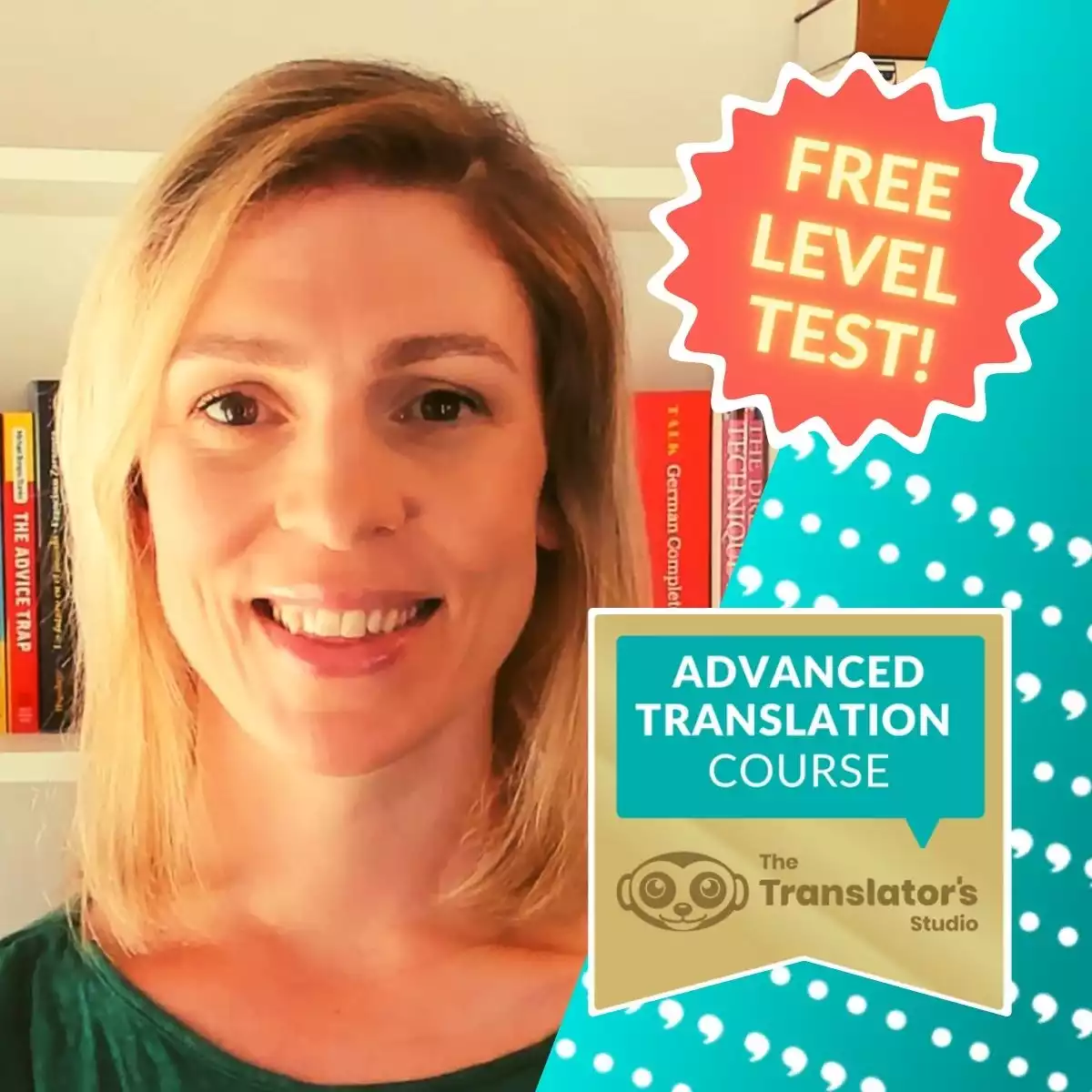
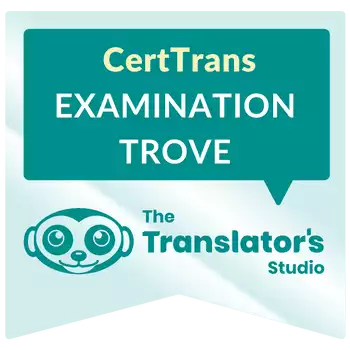




0 Comments